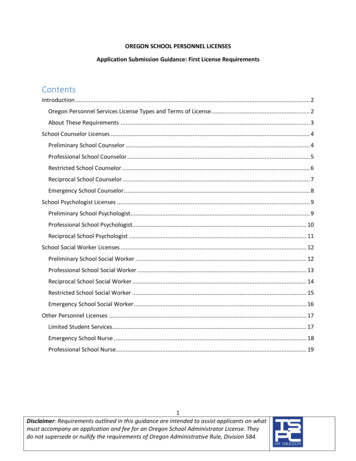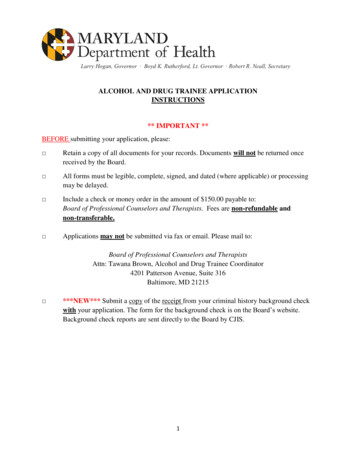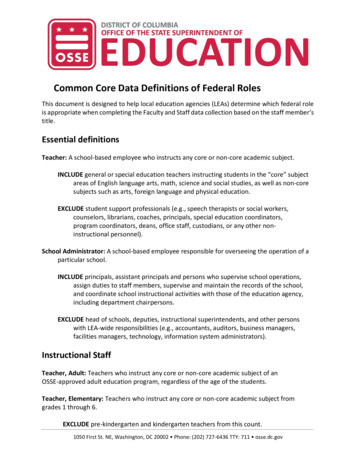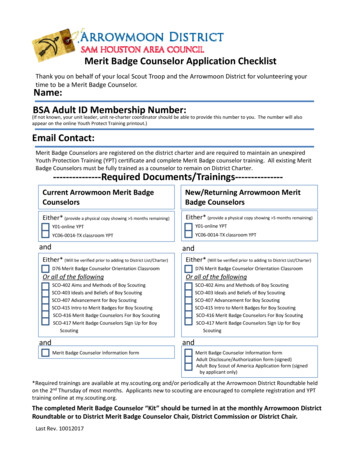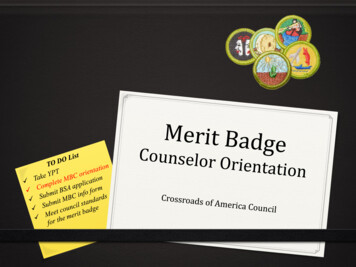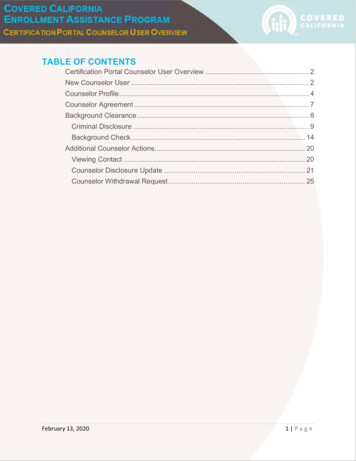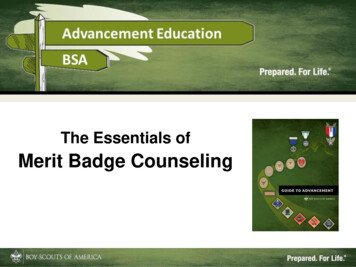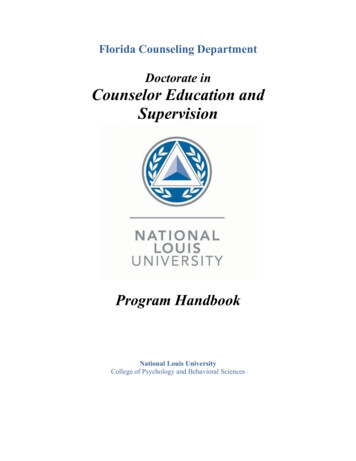
Transcription
Florida Counseling DepartmentDoctorate inCounselor Education andSupervisionProgram HandbookNational Louis UniversityCollege of Psychology and Behavioral Sciences
SUBJECT TO CHANGE NOTICE: The rules, regulations, policies, fees and other charges, coursesof study and academic requirements that appear in this Handbook do not constitute a contractbetween the University and any student, applicant for admission or other person. The Universityreserves the right to change, eliminate and add to any existing (and to introduce additional) rules,regulations, policies, fees and other charges, courses of study and academic requirements. Wheneverit does so, the University will give as much advance notice as it considers feasible or appropriate, butit reserves the right in all cases to do so without notice. In addition, there are further policies that canbe found in the Undergraduate and Graduate Catalog online.AccreditationNational Louis University (NLU) is regionally accredited by the Higher LearningCommission (HLC), one of six regional institutional accreditors recognized by the unitedstates department of education and the council for higher education accreditation.Currently, NLU is on the standard pathway to regional accreditation, which follows a 10year cycle and is focused on quality assurance and institutional improvement. For moreinformation about regional accreditation, visit our institutional accreditation website.National Louis University's is currently seeking accreditation from The Council forAccreditation of Counseling and Related Educational Programs (CACREP) for theirDoctorate in Counselor Education and Supervision program.Diversity StatementThe Doctorate in Counselor Education and Supervision program is committed to theachievement of excellence and diversity for its students, faculty, and staff. The programis committed to recruiting and educating students who reflect the diversity of the Tampametropolitan area as well as national communities where they may be employed.Program curriculum is oriented to promoting an understanding and respect for multipleperspectives that are represented in today’s world.Persons with DisabilitiesNational Louis University is committed to building an inclusive university communitythat welcomes, values, respects and accommodates students from diverse backgroundsand abilities. Students in need of an accommodations or have questions aboutaccommodations, should visit this webpage for contact information and the requestprocess: ns/The University’s Mission StatementNational Louis University provides access to quality higher education that nurturesopportunity for students through innovative teaching, scholarship, communityengagement and service excellence.IICounselor Education and Supervision
University’s ValuesExcellenceWe are committed to providing the highest quality educational experience andadministrative service to each student. We strive to be the best, and to continuallyimprove our processes and outcomes.RespectThe NLU community and its educational philosophy are built on a high regard for thecultures, backgrounds, experiences and dignity of each person. We embrace and buildupon the strength that comes from a diverse student body, faculty and staff.AccessFrom its founding, NLU has provided opportunity for each student. Whether throughdevelopmental support for the under-prepared or through culturally relevant curriculum,each student is brought to a high level of academic achievement, including those whohave historically encountered barriers to higher education.CollaborationAs part of the dynamic creation of ideas and sharing of knowledge, we encourageinterdependent learning relationships among students, faculty and staff, and between theuniversity and its communities.PassionWe are deeply passionate about the fundamental value and importance of the work wedo. An NLU education transforms individual lives, organizations and communities.InquiryWe are committed to fostering a love of learning and intellectual inquiry in all its forms.Faculty and student scholarship both enrich the learning experience and inform our largersociety.InnovationBecause we continually seek to understand and address educational challenges in adiverse and dynamic global era, real-world environments are integrated with theory,creative thinking, and a commitment to social justice.EngagementWe actively reach out to students, schools, businesses, and communities, working handin-hand to achieve mutual goals. That deep involvement is also reflected in how NLUstaff and faculty work collaboratively with their colleagues to provide services andinstruction to each student.Counselor Education and Supervision III
Handbook PoliciesHandbook policies and programmatic revisions contained herein may supersede thegeneral descriptions and explanations set forth in the NLU Catalog.IV Counselor Education and Supervision
Table of ContentsAccreditation . IIDiversity Statement . IIPersons with Disabilities . IIThe University’s Mission Statement. IIUniversity’s Values . IIIHandbook Policies. IVGraduate Acknowledgement. 3Program Description . 3Program Mission Statement: . 3Program Objectives . 3Program Purpose . 4Directory of Support Services . 4Personal Counseling Services: . 5Data Management System – Tevera . 5Program Structure . 5Counselor Education and Supervision Core Courses . 5Component One: Counselor Education and Supervision Core Courses. 5Counselor Education and Supervision Core . 5Component Two: Advanced Counseling Skills, Specialization and Practice: . 5Advanced Counseling Skills, Specialization and Practice . 6Specialty Elective Courses (students pick 2 (total of 6 credit hours of the following):6Component Three: Professional Research: . 6Program Format . 7Classroom Delivery . 7Hardware . 7Software . 7Netiquette . 7Learning Management – D2L . 8Typical Hours in each Course . 8Course Assignments . 8Participation and Posting Policy: . 9Admission to the Program. 9Admission Requirements . 9Provisional Admission . 10Admission Denied . 10Transfer of Credit . 10Counselor Education and Supervision 1
Advisor . 11Degree Requirements. 11Your First Residency – Orientation and Socialization . 12The Second Residency – Counselor Education and Research . 12Professional Activities and Professional Participation . 12Application for Graduation . 13Change of Address . 13Diversity and the Department of Counseling . 13Diversity in the Counseling Profession . 13Diversity among Faculty and Staff . 13Diversity of the Student Body . 13Ethical Behavior . 14Student Retention, Remediation, and Dismissal . 14Satisfactory Academic Progress .Error! Bookmark not defined.Plagiarizing Written Work .Error! Bookmark not defined.University Policy Regarding Academic Honesty .Error! Bookmark not defined.Failure to Meet Academic Standards .Error! Bookmark not defined.Professional Disposition Standards .Error! Bookmark not defined.Remediation .Error! Bookmark not defined.Appeal Process .Error! Bookmark not defined.Grading Procedures . 20Endorsement Policy . 21Advising . 20Programmatic Policies on Writing Proficiency. 20Practicum and Internship . 20Tevera – Field Placement Software . 21Liability Insurance . 23EdD CES Portfolio . 30The Dissertation . 46Dissertation Procedures. 47Educational Support Resources. 47Overview of Periodical and Online Database Resources . 47Learning Support for the Doctoral Program . 47Counselor Education and Supervision Course Descriptions . 49CES Research Courses . 51Specialty Elective Courses (Need 6 hours). 512Counselor Education and Supervision
Doctorate inCounselor Education and SupervisionGraduate AcknowledgementOnce the student has read and understands the program and completed the Live-On-Line Orientation,the student will be requested to complete the graduate acknowledgment form. This form needs to becompleted prior to starting classes. The form can be done online by clicking HERE.Program DescriptionThe Counselor Education and Supervision (CES) program is designed to prepare graduates for careers incounselor education, professional leadership and supervision, advanced clinical practice, advocacy,research, and scholarship. This degree in Counselor Education and Supervision (CES) builds on acompleted 60-hour master’s degree in Counseling with another 60 hours totaling a minimum of 120semester hours of graduate-level credit. The focus of the doctoral degree in Counselor Education andSupervision is to provide graduates with the knowledge and skills necessary for a career in highereducation instruction, advanced leadership skills for leading behavioral health agencies and bydelivering advanced clinical training that will enable them to function in pioneering clinicalenvironments. Those who attain the doctorate in counselor education and supervision earn one of themost respected accomplishments for professional counselors and allow those recipients to betomorrow’s educators, leaders, scholars and advocates for the counseling field.Program Mission Statement:The mission of the NLU Counselor Education and Supervision doctoral program is to prepare anindividual for employment as a counselor educator and supervisor for colleges and universities, as wellas offering advanced clinical, supervision, research and leadership/advocacy training that qualifiesgraduates to be employed as directors of mental health agencies, consultants, supervisors, and leaderswithin the mental health profession.Program Objectives1. Exhibit teaching methods, that include instructional and curriculum design, and assessmentmethods, that are aligned to current ethical, social, and cultural issues within the field ofcounselor education and supervision. [Teaching] – CACREP 6.B.3a-i2. Demonstrate evaluative, gatekeeping, and remediation skills that are based on counselingsupervision methodology and techniques. [Counseling Supervision] – CACREP 6.B.2a-k3. Demonstrate the ability to perform qualitative and quantitative research with an understandingand application of recommended practices for professional writing. [Research] – CACREP6.B.4a-lCounselor Education and Supervision 3
4. Implement advanced counseling skills that are grounded in advanced theory application,assessment, and consultation. [Counseling Skills] – CACREP 6.B.1a-f5. Apply and engage in ethical, legal, and regulatory aspects of the profession. [Ethics] – CACREP6.B.1f, 2j, 3h, 4l, 5l6. Practice ethical and relevant multicultural and social justice strategies and interventions in allprofessional settings. [Multicultural] – CACREP 6.B.1f, 2k, 3h, 4l, 5l7. Articulate and implement leadership theory and social justice advocacy models within thecounseling profession. [Leadership and Social Justice] – CACREP 6.B.5a-lProgram PurposeThe CES program is innovatively designed to prepare graduates for careers in counselor education,professional leadership and supervision, advanced clinical practice, advocacy, research, and scholarship.Program FacultyJoffrey Suprina Ph.D., LMHC, NCCProfessor & Department Chair5110 Sunforest Drive, Suite 202Tampa, Florida 33634(813) 397-2142jsuprina@nl.eduMartin C. Wesley Ph.D., LMHC,LPCC-S, MACProfessor5110 Sunforest Drive, Suite 202Tampa, Florida 33634(813) 397-2152mwesley@nl.eduAbdelaziz Elmadani Ph.D., LPCAssistant Professor5110 Sunforest Drive, Suite 202Tampa, Florida 33634aelmadani@nl.eduAngie Perez Pena, PhD, NCC, LPCAAssistant Professor and Director ofClinical Training5110 Sunforest Drive, Suite 202Tampa, Florida 33634(813) 397-6136aperezpena@nl.eduTremaine Leslie, Ph.D., LAC.Assistant Professor5110 Sunforest Drive, Suite 202Tampa, Florida 33634tleslie@nl.eduDirectory of Support ServicesNLU Toll Free NumberCampus LibrariesLibrary and Learning SupportStudent Experience4800-443-5522312-261-3376 and libref@nl.edu800-443-5522 and learn@nl.edu800-443-5522 (ext. 3568)Counselor Education and Supervision
Personal Counseling Services:Personal counseling services are available to every student. As noted on the NLU website, NLUpartners with Skylight Counseling Center to offer a variety of counseling resources. NLU studentsreceive up to six (6) sessions at no charge. NLU Florida students receive their sessions from the SkylightCounseling Center staff via telehealth. Students seeking additional counseling referrals for licensedmental health professionals should contact the Office of Student Experience at 888.658.8632 x3568 oremail at counseling@nl.edu. The student incurs the cost of additional counseling. The University alsohas additional online supports and mental health screening for the student.Data Management System – TeveraNLU utilizes a data management system for students, supervisors and faculty called Tevera. Tevera ishow all student information, assessments and field placement documents are managed and stored,including a real-time time tracking system of your hours in the field. CES students will store theirPracticum and Internship hours within Tevera. All students are required to purchase and activate apersonal Tevera account through the NLU bookstore within the first term of enrollment at NLU. Just goto the virtual bookstore, type in the ISBN 978-0-9992321-5-6, and the Tevera account will pull up.Financial Aid can be used to purchase Tevera as it is classified as a book purchase. Vouchers or stipendscan be used to purchase. A student’s Tevera account gives him/her/them lifetime access to NLUinformation and much more. When a student is ready to apply for licensure, your Tevera account willgive you all the information you need to apply for professional licensure nationwide by providing a wayto store all of your licensure documents and time sheets, supervision information and access to licensurerequirements for all states. A graduate can also use Tevera to maintain continuing education units,publications, resumes, cover letters, and any documents related to their professional development, withno additional cost for access to this protected data system.Program StructureThe structure of the program falls into three categories:Counselor Education and Supervision Core CoursesComponent One:Advanced Counseling Skills, Specialization and PracticeComponent Two:Component Three: Professional Research: (Research Methods and Dissertation)Component One: Counselor Education and Supervision Core CoursesAll CES students are required to complete eighteen (18) credit hours designed to develop advanced knowledgeand skills in core CACREP areas, along with advanced knowledge and skills in andragogy (teaching techniquesfor adult learners) and supervision in Counselor Education Programs. These courses are:HED 649Teaching in Higher Education3CES 677Curricular Design & Program Assessment in Higher Education3CES 645Multicultural Issues in Counselor Ed and Supervision3CES 644Models of Clinical Supervision3CES 652Advanced Theory and Practice3CES 646Ethics in Counselor Education3Counselor Education and Supervision Core18Component Two: Advanced Counseling Skills, Specialization and Practice:Counselor Education and Supervision 5
Component Two is designed to build advanced clinical knowledge, advanced clinical, leadership, and advocacyskills, and creating a specialization for clinical practice. All CES students must complete eighteen (18) credithours of coursework and professional clinical practice experiences.Three (3) of the hours include a Practicum where the student practices their Advanced Counseling SpecializationSkills in a specialty setting.SpecialtyCourse ISpecialtyCourse IICES 660CES 692CES 690ACES 690BSpecialty Elective3Specialty Elective3Leadership and Advocacy in Counselor EducationAdvanced Counseling PracticumCES Internship ICES Internship IIAdvanced Counseling Skills, Specialization and Practice333318Specialty Elective Courses (students pick 2 (total of 6 credit hours of the following):CES 630Treatment in Sexual DysfunctionCES 620Foundations of MindfulnessCES 628Crisis and Trauma Counseling with Special PopulationsCES 623Death and DyingCES 635Geriatric Neuropsychology and AssessmentHSC 542HSC 543HSC 547HSC 548HSC 550HSC 555HSC 556HSS 547Psychopharmacology for CounselorsIntro. to Theory & Practice of Counseling Children & AdolescentsPrivate Practice ManagementPlay TherapyGrief and LossGeriatric CounselingIntegrating Spirituality in CounselingAlternative Approaches to Addiction Treatment3333333333333Component Three: Professional Research:(Research Methods and Dissertation)Graduates of the CES program will possess highly refined skills as an academic, a clinician and a scholar. TheCES students will build on their leadership in the profession and enhance their counseling knowledge basethrough well-designed, defensible research. Further, the student will demonstrate a proficiency in professionalwriting. All CES students must complete twenty-four (24) credit hours as part of this component.RES 600RES 652RES 654RES 640CES 696CES 697CES 6986Intro to Doctoral Studies and ResearchQuantitative Research MethodsQualitative Research MethodsSurvey Design and Introduction to Statistical SoftwareDissertation ClassesDissertation ADissertation BDissertation CCounselor Education and Supervision3333333
CES 699Dissertation DProfessional Research and DissertationTotal Hours of Program32460A candidate should be able to complete the doctorate in Counseling Education and Supervision inapproximately three to three and one-half years. If after seven years in the program, a candidate has notcompleted the degree, application must be made for additional time to complete the program through thegovernance appeals committee at NLU. Candidates may not remain in the program beyond seven yearsunless an application for a time extension has been approved. Such an approval may include the need foradditional course work to remain current in the field, as well as other conditions.Program FormatThe doctoral degree in Counselor Education and Supervision will utilize a technology-based learningmodel with most of the academic content provided in an interactive, virtual format. Requiredresidencies will be at the Tampa campus or in a centralized location convenient to students. Residenciesare explained in further detail later in this handbook.All courses will be taught in a ten (10) week term. The maximum load typically permitted is six (6)hours per semester. Registering for six (6) hours in a term would require two (2) courses to be takensimultaneously for each term. Students wanting to take more courses beyond the typical six-hour load,will need special permission from their advisor and the Chair. Full-Time students entering into theirthird year, will take only three credit hours each term for their dissertation coursework.Classroom DeliveryHardware To Participate in your Live-On-Line classroom, you will need a Mac or PC in working order. Seethe following for basic requirements: 3System-Requirements-for-PC-Mac-and-LinuxMake sure you have adequate bandwidth foruploading your video and audio and enough download speed to download the video and audio ofyour professor and your peers.While you are in class, make sure no one else in your house is doing heavy. streaming, such asusing Netflix. You and your education are the priority.Make sure you have a working and adequate microphone.Make sure you have a working and adequate webcam.Make sure you have adequate speakers to hear the interaction in the class.Have headphones with an attached microphone for primary use or as a backup.When we are discussing confidential information or information that would not be appropriatefor others to hear, use headphones.SoftwareNational Louis University uses Zoom web conferencing for Live-On-Line sessions. While theinstructors will have their own school accounts, the student can sign up for a free accountat www.zoom.us. Signing up for a Zoom account is not required, but suggested.Counselor Education and Supervision 7
Netiquette Keep your audio muted while you are not talking.Avoid driving and being in class.Try to avoid eating in class, unless it is a long class and approved by your instructor.Pay attention to the way your video is being shown to others.o Avoid windows or bright lights behind you.o Make sure you are centered.Check your surroundings. Make sure you are in an appropriate setting. Avoid being in abedroom, especially when someone is in the bed.The zoom classroom is equivalent to being in a classroom setting, but from the comfort of yourhome. Please make sure that this space is private and free from distractions.Learning Management – D2LOnline coursework at National Louis University exists in the learning management system, D2L(Desire2Learn – Brightspace). As a doctoral student you will be active in this online classroom eachweek where you will be completing coursework for the duration of the program. Posting and attendancerequirements are found in each course syllabus in D2L.Typical Hours in each CourseEvery student is different, and it is difficult to quantify how many hours a typical student will be inclass, reading, studying and completing assignments. This breakdown of a typical class is used only as aguide to help you prepare for the time needed for doctoral work. The Department of Education hasdefined the requirements for the credit hour by using the Carnegie definition. According to this model, athree (3) credit hour class would be earned by students engaged in 45 contact hours of class work andanother 90 hours of outside work (total 135 hours).Hours in Class (10 classes at 1.5 hours per class) 15 HoursWeekly discussions in D2L15 HoursInteractive Media attached to classroom15 HoursDirect Interactive hours45 HoursReadingsMild AssignmentModerate AssignmentMajor AssignmentIndirect Hours in ClassroomTOTL HOURSCourse Assignments25 Hours15 Hours20 Hours30 Hours90 Hours135 HoursEach instructor individually determines the specific assignments and requirements that will facilitatelearning the content. As the nature and content of courses will vary, the activities suggested below are at8Counselor Education and Supervision
the discretion of the instructor. Each course may require some or all of the following:a. a midterm and/or final exam, either essay or objective form;b. a major individual or group research paper or project;c. weekly or biweekly reaction papers and/or quizzes;d. student presentations;e. simulation activities requiring individual participation;f. student journal or other self-reflective writing or personal assessment; and/org. outside investigations in the field of interest.The instructor will have high, yet reasonable, expectations regarding student productivity. If aninstructor has concerns about a student, the instructor will first address his/her concerns with the student,then, with the student’s advisor, and may, finally, discuss the student with the entire counseling programfaculty. Specific assignments will be listed in the course syllabus in D2L.Participation and Posting Policy:Students are expected to be prepared when they enter the Live Interactive Online Classroom. Allstudents are expected to fully participate in all class activities in the Live-On-Line Classroom. Studentsare expected to contribute to class discourse in a meaningful way by referencing academic literature(texts, professional journals, and scholarly works). Students are expected to be respectful of classmatesand refrain from discussion and behavior that is not relevant to the course materials. The Instructor doeskeep a record of your attendance and your participation does count toward your overall grade. Studentsare also expected to watch videos assigned to the class and complete all course assignments. Failure tobe in class are participate in classroom activities may result in a failing grade.Admission to the ProgramAdmission Requir
Tampa, Florida 33634 (813) 397-2142 . jsuprina@nl.edu Angie Perez Pena, PhD, NCC, LPCA Assistant Professor and Director of Clinical Training . 5110 Sunforest Drive, Suite 202 . Tampa, Florida 33634 (813) 397-6136 aperezpena@nl.edu Martin C. Wesley Ph.D., LMHC, LPCC-S, MAC Professor . 5110 Sunforest Drive, Suite 202 : Tampa, Florida 33634 (813 .
